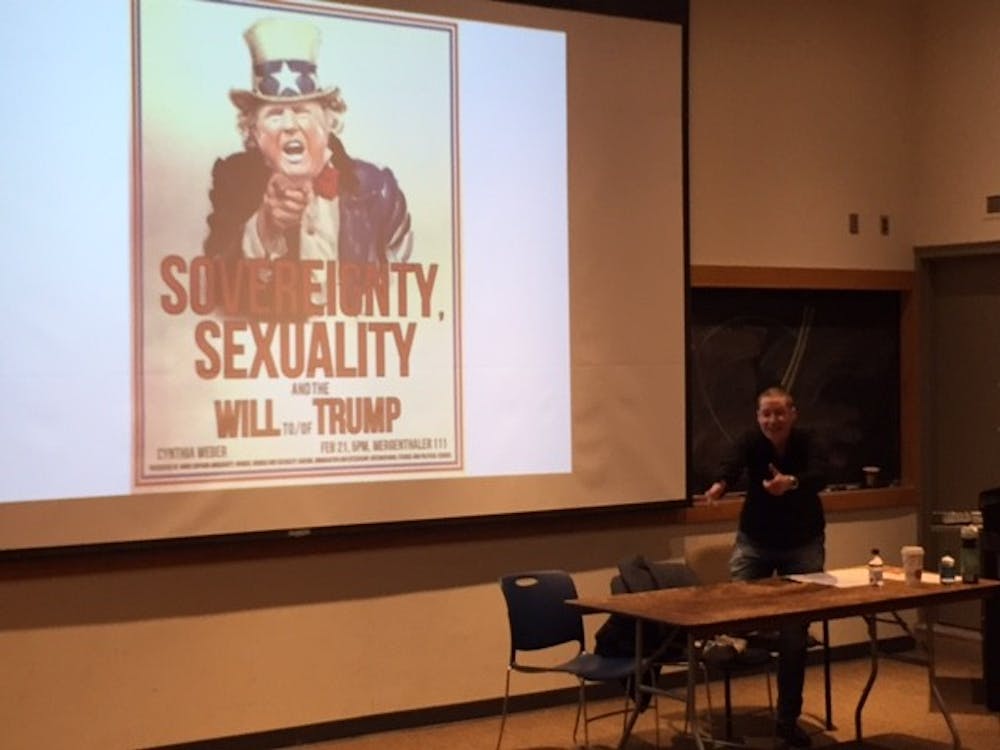Cynthia Weber, international relations professor at the University of Sussex and the author of Queer international relations: sovereignty, sexuality, and the will to knowledge, gave a talk titled “Sovereignty, Sexuality and the Will of Trump” on Tuesday evening in Mergenthaler Hall.
An opponent of President Donald Trump, Weber drew from her book to delineate her thoughts on two issues.
Weber explained that while Trump has already been inaugurated, it is important to evaluate his campaigning strategies, especially since he still holds speeches strikingly similar to his rallies during the campaign.
“All indications are is that all he does is campaign,” she said. “And that there are a lot of things happening in the White House that try to enable the Trump presidency not just for four years, but eight years.”
With regard to analyzing the will of Trump, Weber posed the question: “What kind of fake is Donald Trump?”
“To me, that’s a more vital question than it may at first appear to be,” she said. “Because I think how we regard Trump and his presidency matters for these two reasons. First, it matters how we understand what he does on a daily basis. And secondly, for those who oppose him, it matters because of how we might best resist or oppose his policies.”
She went on to read a piece by Damien Love that was published by Scotland’s Sunday Herald and went viral in Jan. 2017. The piece, a brief preview for Trump’s inauguration, was written in the structure of a preview for an upcoming episode of Rod Sterling’s science fiction television series the The Twilight Zone.
“The story begins in a nightmarish version of 2017 in which huge sections of the U.S. electorate have somehow been duped into voting to make Donald Trump president,” Love wrote.
Weber agrees with Love that Americans are living through a sort of Twilight Zone, but she nevertheless felt that there were reasons to dispute his depiction.
“Now to be fair, Love’s a journalist, he writes about TV listings, this is not his charge,” she said. “But it is ours.”
She outlined three principal flaws with Love’s account. The first being that it obscured the historical conditions that made a Trump presidency possible.
“He presents the Trump moment as though it were without history and without context, as a horrible surprise that is just now in hold,” Weber said. “Love misses how Trump’s campaign and presidency are part and parcel of earlier historical experiments.”
Such experiments, Weber continued, included “white, Western heteropatriarchal authoritarian leadership” and neoliberalism. She said that Love also failed to acknowledge Trump’s own history of discrimination.
His racism, she elaborated, does not date back to Trump accusing former President Barack Obama of not being born in the U.S., but to his belief that the “Central Park 5”, a group of five black and latino teenagers who were wrongfully convicted for raping a 28 year old banker in 1989, were guilty.
“Trump continues to be a serial liar, who incessantly repeats lies big and small,” she said. “He does this to the point where empirical facts and judicial judgments that contradict his lies seem to be not only incorrect, but dishonest to the point of conspiratorial.”
Two other major flaws with Love’s depiction, Weber said, were his failure to outline the specific form Trump’s “simulated experiment” takes. According to Weber, one thing that Trump does simulate is sovereignty.
“Sovereignty is a concept, a logic and a performative concept,” she said. “It functions in many registers, often at the same time. Simulating sovereignty is nothing new. It’s been employed by many leaders.”
Weber spent the rest of her talk elaborating on how the Trump administration uses representation, simulation, and dissimulation to cement its power.
“Trump relied on various notions of representation or what appear to be representation, to craft that particular sovereign subject in whose name Trump claimed he ought to be president, and in whose name he now claims he rules,” she said.
She stated that Trump’s campaign used three interrelated ideas at the heart of America’s conception of sovereignty: patriotism, the melting pot myth and the American Dream. According to Weber, Trump’s campaign drew from a long U.S. tradition of fear based patriotism.
Weber listed the forms of discrimination upon which his campaign relied, including racism, ableism, and homophobia.
“As [the campaign] did so, it cultivated anger about a loss of white privilege, and particularly white male privilege and it refused to disavow white supremacists like the KKK who endorsed the campaign,” she said.
She stated that Trump relied extensively on his Twitter feed and campaign rallies to encourage such fears and concerns about these groups.
“By propagating this particular form of fear based patriotism, the Trump campaign stripped post 9/11 American patriotism of any pretense that it valued American diversity,” she said. “And in so doing, the Trump campaign, as many had done before, rewrote the US melting pot.”
She then described the idea that Americans value all citizens equally as a myth, saying that the Trump campaign drew on this fact to augment its own power. In addition to encouraging fear of certain groups, she said, Trump encouraged anger, resentment and violence towards them.
In regards to how the American Dream was used to strengthen Trump’s campaign, Weber pointed to the way Trump represented himself as the embodiment of the American Dream.
“A lot of people forget that the American Dream is a sovereign dream,” she said. “It tells you as citizens you can be sovereign in your own destinies, your individualistic wealth creed, which is as good for them as individuals, as it is good for the collective U.S. sovereign states capitalist project.”
She pointed out how Trump also used the American Dream as a way to increase resentment against minority groups.
“Trump seemed to appeal to particularly white Christian male working class voters by acknowledging their failure to achieve or retain their American Dreams, and by reassuring them that their failures were the fault of the domestic and foreign enemies who had stolen them,” she said. “These enemies were immigrants, Muslims, sometimes African Americans, and anyone else who is getting an advantage in the politically correct rigged system.”
In the end, she declared, Trump won because of his rhetoric.
“Trump did not win the presidency in spite of his vile comments and vile behavior, he won the presidency because of his comments and actions, and because of how the campaign mobilized them,” she said.
Weber stressed, however, that it was important not to categorize all Trump supporters as bigots.
“It’s always important to pause here and say this doesn’t mean that every Trump voter consciously identified with the Trump campaign’s bigoted showmanship structure of understanding social relations and power that their votes legitimated,” she said. “It’s an effect, not an intention. Nor is it to say that Hillary Clinton’s brand of neoliberalism is an ideal alternative.”
Weber deliberated on the uncertainty under Trump’s presidency, especially because, she argued, Trump’s own beliefs are not fully set in stone.
Students like freshman Serwah Afranie were intrigued by this notion.
“I found it interesting when she mentioned that Trump does not know what he thinks,” Afranie said. “It puts a lot of things into perspective for me. It made me question if Trump was really the mastermind behind all the policies he is advocating. Does he really know what he's doing? Is he really in charge of the presidency? Or is he merely a puppet?”
Freshmen Abigail Johnson thought that Weber did well to hit on some of the pressing problems facing the progressive movement during Trump’s presidency.
“I found Weber's discussion on the "iterations" of the Trump machine particularly refreshing,” she wrote in an email to the News-letter. “Weber's point is that finding weak points in the machine, rather than finding fault in the machine's iterations, is what is most effective against Trump and his movement. I agree with her that is not simply enough to keep pace with the administration. As a movement, the progressives would be much better off if they could anticipate where Trump's policy is going and block it anticipatorily.”





